Search
Search for "click":
(Click here to search this entire website for "click" with Google.)
 |

|
|
Determine your current position with GNSS 5 click. It carries the NEO-M8N GNSS receiver module from u-blox. GNSS 5 click is designed to run on a 3.3V power supply. The click communicates with the target microcontroller over I2C or UART interface, with additional functionality provided by the following pins on the mikroBUS™ line: RST, INT, PWM. |
|
|
|
 |

|
|
Haptic click carries DRV2605, a Haptic Driver for ERM and LRA vibration motors (acronyms stand for Eccentric Rotating Mass and Linear Resonant Actuator, respectively). The DRV2605 IC integrates an extensive library with over 100 haptic effects. These include audio-to-vibe features, which generate vibrations from the lower frequency range of the audio input (licensed version of ToushSense 2200 effects from Immersion). The board also carries screw terminals for connecting said motors, as well as an audio interface (3.5mm jack). Haptic click communicates with the target MCU through mikroBUS I2C (SCL, SDA), EN (in place of CS) and PWM pins. The board is designed to use either a 3.3V or 5V power supply. |
|
|
|
 |
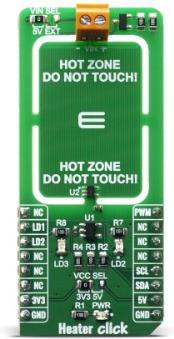
|
|
Heater Click is designed with intention of PCB heater concept testing and useful tool for heating complete casing where staying in specified temperature range is crucial. Exact PCB temperature can be set and controlled using TMP235 on board temperature sensor from Texas Instruments. Heater Click is useful tool for some projects and products that require some kind of heating, whether to prevent electronics from becoming too cold, to help control humidity, to heat up a substance, or even to prevent one material from sticking to another.
Heater Click board™ is supported by a mikroSDK compliant library, which includes functions that simplify software development. This Click board™ comes as a fully tested product, ready to be used on a system equipped with the mikroBUS™ socket.
|
|
|
|
 |

|
|
IQRF 2 click carries the DCTR-72DAT RF transceiver, operating in the 868/916 MHz frequency. The click is designed to run on a 3.3V power supply. It communicates with the target microcontroller over SPI or UART interface, with additional functionality provided by the following pins on the mikroBUS™ line: AN, PWM. |
|
|
|
 |
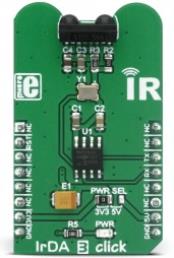
|
|
IrDA 3 click is an intelligent IR transceiver device that can both send and receive UART commands via the IR interface. IrDA 3 click features both the IR transceiver and the encoder/decoder IC, used to convert the UART data and send or receive it in IrDA® compatible format. IrDA 3 click also has an onboard clock generator for the fastest possible UART performance of 115,200 bps, so it does not need an additional clock signal to be generated by the MCU.
IrDA 3 click provides a direct and easy to use UART to IrDA interface. The device can be used for various applications that use the short-range remote communication, such as fax machines, photocopiers, screen projectors, TV boxes, Data loggers, GPS, various system controllers and many other IRDA standard compatible applications. |
|
|
|
 |
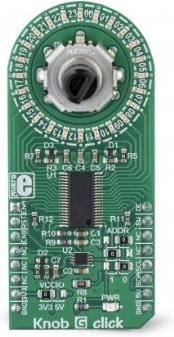
|
|
Knob G click features a combination of high-quality quadrature rotary encoder, and a LED ring composed of 24 individual green LEDs. Outputs of the rotary encoder are processed by a debouncing circuitry, which ensures reliable switching action, making the encoder directly usable in interrupt service routines (ISR) without the need for a bulky debouncing code. The 24-segment LED ring is driven by an advanced and flexible LED driver IC, which can dim each LED individually, allowing various lighting effects to be programmed. The LED ring is independent of the encoder, and it can be used as a very flexible position or value indicator.
Knob G click is supported by a mikroSDK compliant library, which includes functions that simplify software development. This Click board™ comes as a fully tested product, ready to be used on a system equipped with the mikroBUS™ socket.
|
|
|
|
 |

|
|
LoRa 2 click carries Microchip's RN2903 915 MHz Radio Modem compliant with regulations for use in the United States, Canada, Australia and New Zealand. See the manufacturer's data sheet for detailed information.
A European version is available separately.
The RN2903 module has a specified range of >15km in rural and suburban settings, and >5km coverage in urban areas. A LoRaWAN Class A protocol stack is embedded (bidirectional end devices), as well as an ASCII command interface accessible through UART. The high receiver sensitivity can go down to -146 dBm.
LoRa click communicates with the target board MCU through the mikroBUS UART interface (CTS, TXD, RXD), with the addition of a Reset pin (RST) and RTS. The board is designed to use either a 3.3V or a 5V power supply.
|
|
|
|
 |
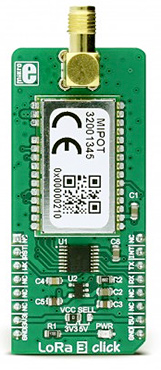
|
|
LoRa 3 click is a LoRa™ technology based SRD transceiver, which operates at sub-gigahertz frequency of 868MHz. Thanks to the spread spectrum modulation feature, as well as the low power consumption, it is capable of achieving a long-range communication, immune to interferences. This click board™ features a complete LoRa™ stack onboard: it implements physical, network and MAC layers, allowing for easy operation via the UART interface. The transceiver is RED 2014/53/EU certified and compliant to ReACH and ROHS regulations, allowing for an easy integration into the final application, reducing development time, costs, and time to market. |
|
|
|
 |
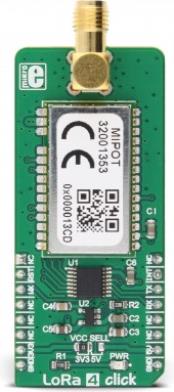
|
|
LoRa 4 click is a LoRa RF technology based SRD transceiver, which operates at sub-gigahertz frequency of 868MHz. Thanks to the spread spectrum modulation feature, as well as the low power consumption, it is capable of achieving a long-range LPWAN communication, immune to interferences. This click board™ features an embedded LoRaWAN™ Class A compliant stack. The transceiver is RED 2014/53/EU certified and compliant to ReACH and ROHS regulations, allowing for an easy integration into the final application, reducing development time, costs, and time to market. |
|
|
|
 |
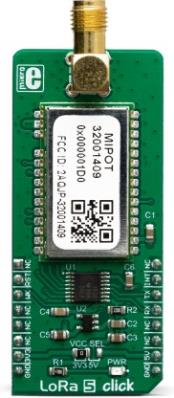
|
|
LoRa 5 click is a LoRa technology-based SRD transceiver Click board™, which operates at a sub-gigahertz frequency of 915MHz. Thanks to the spread spectrum modulation feature, as well as the low power consumption, it is capable of achieving a long-range communication, immune to interferences. Operated over the UART interface, it represents a very simple, yet powerful solution for the LoRa-based IoT communication network.
Lora 5 click is supported by a mikroSDK compliant library, which includes functions that simplify software development. This Click board™ comes as a fully tested product, ready to be used on a system equipped with the mikroBUS™ socket.
|
|
|
|
 |
|
<< First
< Previous
Next >
|
|

